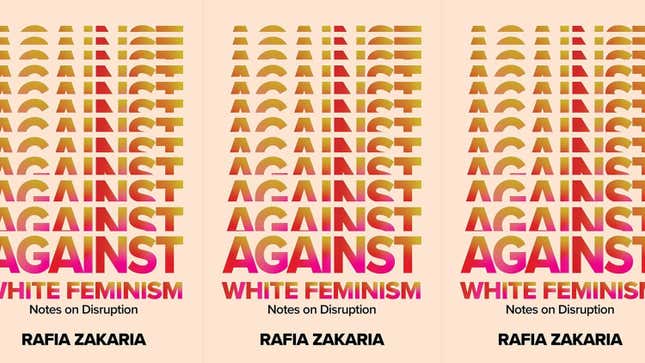Writer Rafia Zakaria Takes on Sexual Liberation, Capitalism, and White Feminism
Jezebel chats with the author of your new favorite read, Against White Feminism: Notes on Disruption
BooksEntertainment

The feminism of academia is a far cry from the feminism of the real world, as writer Rafia Zakaria points out in her new book Against White Feminism: Notes on Disruption. In one chapter, titled “Sexual Liberation Is Women’s Empowerment,” Zakaria writes, “The question of how and when sexual liberation had become not simply the centerpiece but the entire sum of liberation for a graduate seminar on feminist theory never came up, nor did any discussion of sexual identity or radial politics.” She describes what feels like a universal experience for an entire generation of people who studied a white-washed feminist theory, capturing lightning in a bottle and wielding it in every sentence. Against White Feminism is a book animated by the slow simmering rage of feminists of color who have been meticulously erased from the hallowed halls of academia.
Zakaria’s book belongs on every person’s bookshelf. But it also belongs on a syllabus and to be seared into the minds of students learning about the historic implications and monumental failings of westernized white-washed feminism. The book isn’t just an educational tome—Zakaria deftly weaves in personal stories to make Against White Feminism extremely readable and at times heart-wrenching.
We spoke to Zakaria spoke about her new work and broke down why this book is so vital and why she hopes white feminists will give it a chance. The following interview has been edited and condensed for clarity.
JEZEBEL: How would you describe this book to people who haven’t read it yet?
RAFIA ZAKARIA: I would describe this book as presenting a new frame to view the world and particularly at gender and race relations so that they can see how the inequalities caused in particular by gender and race have seeped into every aspect of our society. I wanted people to be able to give this book to my white friends and to my BIPOC friends, for different purposes. For white women, in particular, I wanted them to understand how besieged BIPOC women feel from all sides in terms of all these different cultural forces, political forces, etc., pushing up against them. And I wanted BIPOC women who have had their own experiences but don’t necessarily put them together or collate them in this way to be able to see that their experience of white supremacy is often repeated in the same pattern and often by the same perpetrators in [places like] Afghanistan and Iraq, in Pakistan and many other neocolonial endeavors.
Let’s get into some of the themes you touch on in the book. In chapter five, titled “Sexual Liberation Is Women’s Empowerment,” you talk about your first experience in a feminist theory class and as I was reading I almost had a sort of epiphany that was like, “Wow, this is exactly the kind of class I was sitting in when I was in school where women of color just don’t get included in the syllabus or in the discussion.”
As you can see in the book, I had a lot of sort of front lines, or say experiences. I was a single mother. I had to stay in a shelter. I had to really kind of put together an existence. But then when I went to graduate school, my naive assumption was that this is a place where I’ll get to understand what has happened to me and how it connects with the larger world. I wanted to have conversations about gender equality, gender discrimination, and neocolonialism.
There was a war going on in Afghanistan [at the time I was taking this class] that was allegedly meant to liberate Afghan women and I expected that sort of thing to be talked about in this particular seminar. So it was a moment of kind of deep disappointment when I experienced the narrowness of that conversation and the inability to really connect the feminist struggle to women who have fought frontline battles against sexism, against abuse, and—I expected at least a little bit of those things. I expected that there wouldn’t be this kind of rote acceptance atmosphere where we just talk about kink and everything was about Sex and the City. Not that those things should not be discussed in feminist theory courses, but it’s just that they shouldn’t be the only things that are discussed. I felt that this idea of sexual liberation being the sum total of empowerment was never questioned.
I felt that this idea of sexual liberation being the sum total of empowerment was never questioned
This was something you brought up in that chapter that really resonated with me as a person who converted to Islam in college. You mentioned that you were expected to perform a certain degree of sexual liberation as a Muslim woman in a way that was more palatable to Western ideals. Do you think those expectations still exist for Muslim women in America?
-

-

-

-

-

-

-

-

-

-

-

-

-

-

-

-

-

-

-

-

-

-

-

-

-

-

-

-

-

-

-

-

-

-

-

-

-

-

-

-








































